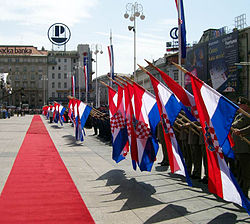Statehood Day (Croatia)

| National Day | |
|---|---|
 Croatian flags on Statehood Day, 2007 | |
| Official name | Dan državnosti (in Croatian) |
| Observed by | Croatia |
| Significance | Anniversary of the constitution of the 1990 Croatian Parliament |
| Celebrations | Family reunions, barbecues, picnics, parades |
| Date | 30 May |
| Next time | 30 May 2025 |
| Frequency | annual |
National Day (Croatian: Dan državnosti, pronounced [dan dr̩ʒaʋnosti]) is an annual public holiday and national day celebrated on 30 May in Croatia to celebrate the constitution of the first modern multi-party Croatian Parliament in 1990. As a national day and public holiday, it is a non-working day for all government employees and the majority of the labour force based in Croatia.[1]
While there are no strict or established forms of celebration associated with the holiday, it is usually celebrated outdoors. The day is usually marked by family reunions, picnics, barbecues, flag-raising and national anthem-playing ceremonies and by civilian and military parades on quinquennial or decennial anniversaries.
History
[edit]On 30 May 1990, the first modern multi-party Croatian Parliament convened, following the 1990 Croatian parliamentary election. On 25 June 1991, after the independence referendum held on 19 May 1991, Croatia proclaimed its independence, but due to the negotiation of the Brioni Agreement, a three-month moratorium was placed on the implementation of the decision and the Parliament cut all remaining ties with Yugoslavia on 8 October 1991.[2]
30 May was from 1990 to 2002 marked as the Statehood Day.[3] The Government of Ivica Račan moved the Statehood Day to 25 June in 2002, and 30 May was marked as a memorial day (working) under the name Day of the Croatian Parliament.[4] 8 October was a holiday, Independence Day from 2002 to 2019, when it was declared a memorial day (working).[1]
Slovenia declared independence from Yugoslavia at the same time, and its Statehood Day coincided with the Croatian Statehood Day, on 25 June. On 14 November 2019, the Croatian Parliament adopted a new law on holidays, and moved National Day back to 30 May.[1]The previous date, 25 June, was attributed to Independence Day, which became a working memorial day, itself moved from 8 October.
Activities and celebrations
[edit]Typical state activities on the occasion involve speeches by the President of Croatia and other dignitaries, as well as commemoration of the Croatian War of Independence.[5][6] The first military parade of the Armed Forces of Croatia took place in the neighborhood of Jarun in 1995.[7][8]
See also
[edit]- National Day in other countries
- Holidays in Croatia
- Independence of Croatia
- Croatian War of Independence
References
[edit]- ^ a b c "Dan državnosti ponovno će se slaviti 30. svibnja, a uvodi se novi blagdan i neradni dan 18. studenog". Večernji list (in Croatian). 14 November 2019. Retrieved 17 November 2019.
- ^ "Odluka Sabora Republike Hrvatske o raskidu državno-pravne sveze s ostalim republikama i pokrajinama SFRJ (8. listopada 1991.)" [Decision of the Parliament of the Republic of Croatia on the termination of all state and legal ties with other republics and provinces of SFRY (8 October 1991)]. Povijest saborovanja (in Croatian). Croatian Parliament. 8 October 1991. Retrieved 25 June 2011.
- ^ "Dan državnosti – Tri rođendana: Svaki datum ima povijesno značenje za Hrvatsku". Večernji list (in Croatian). 24 June 2011. Retrieved 25 June 2011.
- ^ Croatian Parliament (21 November 2002). "Zakon o blagdanima, spomendanima i neradnim danima u Republici Hrvatskoj". Narodne novine (in Croatian) (136/2002). Retrieved 25 June 2011.
- ^ "Hrvatska proslavila Dan državnosti". Poslovni dnevnik (in Croatian). 26 June 2009. Retrieved 25 June 2011.
- ^ "Dan državnosti: Ivo Josipović, Jadranka Kosor i Luka Bebić na Ovčari". Jutarnji list (in Croatian). 25 June 2011. Retrieved 25 June 2011.
- ^ Gjenero, Davor. "Hrvatska parada i konfuzna poruka susjedima". balkans.aljazeera.net.
- ^ "Vojna parada pobunjenih Srba u Slunju lipnja 1995. godine". vojnapovijest.vecernji.hr.